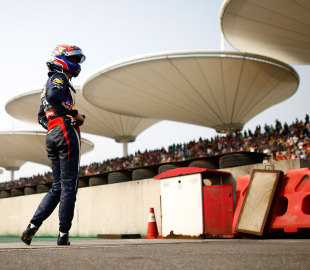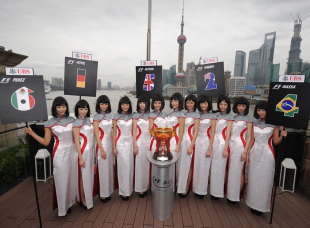

- Race:
- Chinese Grand Prix
Formula One has an odd relationship with Shanghai, with many of my colleagues dreading the annual visit to China. And while the visa application process never fails to produce a few migraines, I fail to understand the general sense of loathing for what is one of my favourite rounds on the calendar.
Like any big city, Shanghai has its plusses and minuses. The language barrier makes life interesting, and the traffic is on a par with Sao Paulo when it comes to spending hours stuck in endless jams. But it is a bustling metropolis with far too many options - for food, for entertainment, for socialising - to be as roundly dismissed as it has been.
But the problem with the Shanghai race is not with the city itself - it is with the location of the circuit. The impressive UBS bridges that straddle the pit straight are around 30 miles from Shanghai, which is akin to holding a race in the Chilterns and calling it the London Grand Prix. Thanks to the aforementioned traffic problems, the bulk of the press corps elect to stay in Jiading, a one-horse (but growing) town rich in Chinese history but poor in terms of a nightlife.
While staying close to the track is a bonus, it is the press corps' refusal to engage with the city of Shanghai that seems to be the basis of much of the ill-feeling about the race. Rather than spending the post-work hours exploring the bustle of the Bund, or discovering local delicacies in hole-in-the-wall restaurants, much of the press pack sits in a lonely business hotel, bemoaning the lack of things to do.
In my early years in the sport I followed the herd to Jiading and saw next to nothing of Shanghai itself. This life can all too easily become a routine of airport-circuit-hotel, but that is a wasted opportunity. Working in Formula One affords us with the opportunity to visit 19 countries a year - more than many people are lucky enough to experience in a lifetime. But one Best Western is much like another, and food in business hotels is about as varied as food on airplanes.
For the past two years I have made a point of getting to races a day or two early, and exploring my host cities. It's a freedom I have as a freelancer, and it has been the cherry on the delicious cake that is life as an F1 journalist.
I can't pretend to be an expert in Chinese culture, or the tourist hot-spots of Shanghai, as my preferred modus operandi has always been to wander the streets until I get lost, and to keep wandering until I get found again.

For me, Shanghai is a city of hawkers peddling Bolex watches and Lewis Vuitoon handbags, of giant glass skyscrapers sitting next to tiny alleyways filled with wizened old men and women clacking away at Mah-jongg tiles as they drink endless cups of black tea. Bicycles compete with supercars for space on the heaving elevated roads, and restaurant menus read more like a list of exhibits at the zoo than animals I'd ever contemplated eating.
What makes Shanghai such an exciting place to be is the sense it creates of being a young city in a very old culture. China's ever-increasing dominance as a world power sees cities like Shanghai and Beijing straddle communism and capitalism, selling consumerism to the growing middle- and upper-classes as they seek to find a way of working with the wider world without compromising their political ideology.
It is a petri dish of change, a city whose neon-lit skyline brings to mind Bladerunner or Fritz Lang's Metropolis. Sadly, it's a view that can't be seen from the hotel bars in Jiading. To love Shanghai, first you must experience it.
